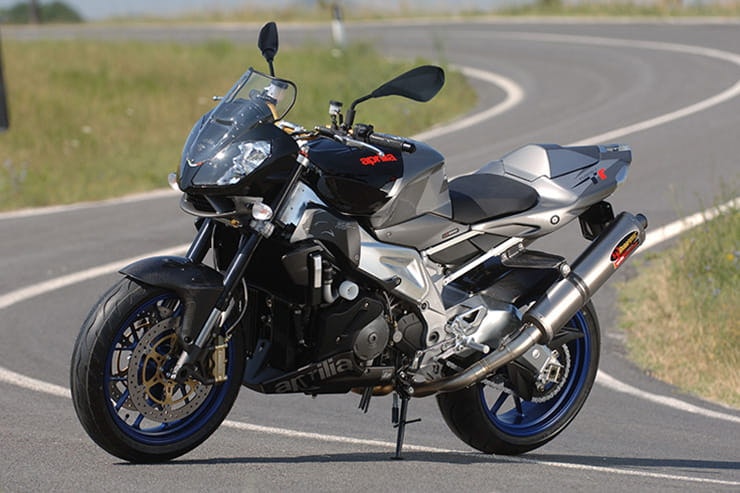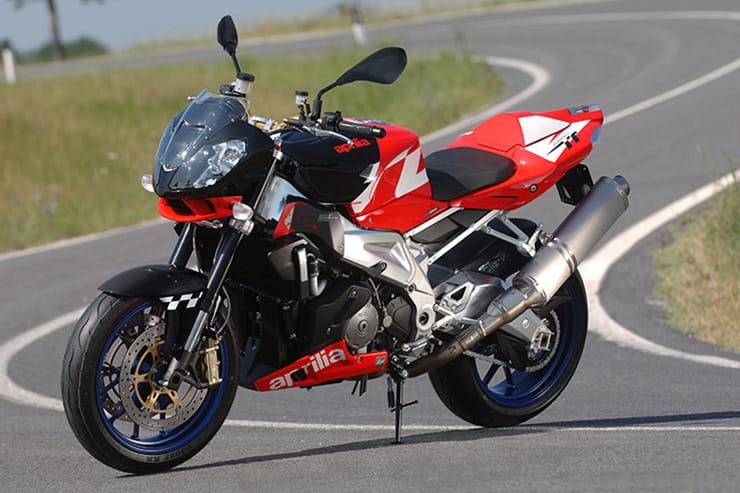Aprilia Tuono 1000R & Factory (2006-2010) - Review & Buying Guide
By Jon Urry
Massively experienced road tester
14.02.2023
Price: £2800-£6500 | Power: 139bhp | Weight: 185kg | Overall BikeSocial Rating: 4/5
The second generation of Aprilia’s rip-roaring naked bike continued from where the first generation left off. Still little more than the firm’s RSV sportsbike with flat bars and a smaller front fairing fitted, the updated Tuono was now based around the next generation of RSV. Unleashed in 2006, the Tuono 1000R was quickly followed a year later by a top-spec Factory model, which boasted the usual lightweight OZ Racing wheels and Öhlins suspension upgrades. Still an absolute bargain in the used bike market, the ‘twin-pipe’ generation eventually made way for the Tuono V4 in 2010 but if you like your naked bikes to be V-twins and also great value for money (and arguably more reliable than the V4...), look no further than the Tuono 1000R and Tuono 1000R Factory.
A solid and reliable naked bike
Cheap to buy and run
Surprisingly comfortable and practical
Can feel a bit top heavy
There are a few annoying quirks you need to keep on top of
The throttle response can be quite abrupt
Aprilia Tuono 1000R and Tuono 1000R Factory (2006-2010) Price
The Tuono cost just under £8000 when it was launched with the Factory upping this by £2000 a year later, which was pretty good value. The hideous gold frame on the Factory didn’t add any extra to the RRP... Nowadays you can get a high-milage Tuono for as little as £3000 from a dealer with private sales dipping under the £3000 mark, although a bit of caution is advised if you are spending this low figure and certainly an HPI check is recommended. Most dealers seem to be pricing a good Tuono between £3500 and £5500, which isn’t bad value at all. If you want the Factory you have to expect to pay a few extra quid with prices starting at £4000 and again, rising to £5500-£6000 for a very late model. Oddly, the gold frame Factory is quite sought after by buyers but the stock Tuono doesn’t seem to have any favoured colour options.
Engine and Performance
As with the first generation of Tuono, the second generation gains a full-on RSV sportsbike motor with no retuning or tweaking and the slight drop in power only due to different airboxes and induction routing. A completely new V-twin motor, the V60 Magnesium Evolution makes a claimed 139bhp and 79lb-ft of torque, up from the old model’s V990 engine’s 128bhp and 76lb-ft of torque. Still a really thrilling and quick-revving V-twin, the Magnesium is less rattly and raw than the V990 and yet still just as much fun when you give it gas – especially if you lower its gearing by adding two teeth to the rear sprocket or removing one from the front. But it also suffers from the same old issues as the V990...
If you don’t get the throttle bodies balanced by someone who knows their stuff the Tuono can be a pig at low speed and very abrupt on the throttle response, which ruins the ride quality. Also the clutch is notorious for letting air into the system, making selecting neutral hard and requiring regular bleeding as a result. Neither of these issues are particularly worrying, and both can be fixed quite quickly and cheaply, however you do still need to be a bit careful when buying a used Tuono.
Always keep an ear out for a squeak when the starter is pushed as that hints at a weak sprag clutch, an issue caused by the bike being started (or attempted to be started) when the battery is low on juice. Getting it replaced can be quite a fight and costs roughly £400. If you own a Tuono, always keep it on a trickle charger and uprate the battery to one with a higher CCA than standard. Generally, however, the Magnesium engine is pretty solid and as long as you stick to its service schedule (a minor service every 6000 miles and a major at 12,000 miles, which includes valve clearances) and go to someone who knows their stuff when it comes to Aprilia’s V-twins you should be in for years of hassle-free motoring.
Aprilia Tuono 1000R and Tuono 1000R Factory (2006-2010) Handling & Suspension
The second generation of Tuono has exactly the same chassis and suspension as the second generation of RSV sportsbike and that means it is properly capable in the corners. Although still quite a top-heavy and tall bike, the Tuono rewards the dedicated rider with full-on sportsbike-matching handling that is only enhanced in the Factory model through Öhlins suspension and lightweight OZ Racing forged alloy wheels. A huge benefit of the Tuono’s wide bars compared to the RSV’s clip-ons is that you have lots of leverage to thrown the Tuono into bends and also a wide area to brace against when you brake, something that is helpful as the radial Brembo set-up (with braided lines as standard) is fairly ferocious on both Tuonos! Well, on the front it is... Yep, another standard Tuono issue is the location of the rear brake master cylinder, which allows air into the system and also likes to overheat due to the fact it is situated right next to the exhaust! Either bleed it regularly or fit some aftermarket rearsets that reposition the master cylinder vertically. Speaking of foot pegs...
When buying used there are a few key areas on the Tuono to check. If the bike has been dropped the twin pipes have a habit of pushing into the swingarm, causing damage, and so do the pegs which can also harm the frame. This can easily write a bike off so always perform an HPI check to see if it has been in an insurance claim and then put back on the road. Also be a bit careful with the higher spec model of Tuono as the Öhlins forks can crack around their pinch bolts if over tightened and do pop seals more regularly than the base model’s Showa units. It is also worth remembering that the Factory’s Öhlins shock can be rebuilt where the stock model’s Sachs unit can’t, which is a longterm cost-saving.
Comfort & Economy
The Tuono may be a sporty super naked but it is also surprisingly practical thanks to the fact it is a big and roomy motorcycle and that means you can certainly take it on trips away - as long as the speeds are kept fairly low on the long straights to save your neck muscles. A few owners fit taller screens, but they make the already slightly odd looking Tuono even less visually appealing! When it comes to economy the Tuono records around 40mpg, but this is very much depended on the speed as it isn’t the most aerodynamic of bikes!
Aprilia Tuono 1000R and Tuono 1000R Factory (2006-2010) Equipment
There are no rider assists on either model of Tuono (aside from a lap timer) and also no fuel gauge, which is a bit annoying. When it comes to accessories, however, the world is your lobster...
In order to gain some performance, most owners junk the heavy OE cans for lighter aftermarket units (single or twin, if you get a single ensure there is a ‘scavenger’ link pipe to help the engine’s gases flow), which sound like thunder and also improve the handling as they shed a stack of weight. The airbox modification is popular (you lose the top of the airbox and mate it to the bottom of the tank to gain volume and performance) and most Tuonos are down-geared, which isn’t an issue for the speedo’s accuracy and makes them even better fun. When it comes to cosmetic add-ons, bar end mirrors, brush guards, tail tidies, mini indicators etc are very prevalent. Owners often upgrade the clutch master cylinder in an effort to stop it letting air into the system and also fit rearsets to make the rear brake work properly. Both are good mods. You can fit Factory parts to the base model however they may require spacers etc so always go on a forum and ask the question before attempting, loads of owners have done it so there is always advice out there. A few Tuonos get their engines big-bored but this isn’t a great route if you are after reliability.
Aprilia Tuono 1000R and Tuono 1000R Factory (2006-2010) Rivals
The whole super naked class was still quite in its fledgling stages in 2006 and there were the likes of the wacky-looking Kawasaki Z1000, dull Honda Hornet 900 and feisty Yamaha FZ1 but the Tuono’s real competition came from Europe. Ducati water-cooled their Monster to create the S4R and later the awesome S4RS, KTM had the wild V-twin Super Duke and Triumph’s Speed Triple was now a 1050. Generally, Aprilia’s fans bought the Tuono, KTM’s fans went for the Duke, those with cash bought the Duke and the masses went for the Speed Triple.
Ducati Monster S4R, (2001-2007) | Approx Price: £5500
Power/Torque: 97bhp/64lb-ft | Weight: 192kg
KTM 990 Super Duke, (2005-2013) | Approx Price: £5000
Power/Torque: 120bhp/73lb-ft | Weight: 179kg
Triumph Speed Triple 1050, (2005-2010) | Approx Price: £4500
Power/Torque: 131bhp/77lb-ft | Weight: 189kg
Aprilia Tuono 1000R and Tuono 1000R Factory (2006-2010) Verdict
The V-twin Tuono is a really great bike that is heaps of fun to ride, remarkably practical and also cheap to both buy and run. If you get a good one, and it isn’t hard to locate a decent version, you will be very happy indeed. And if you like gold frames, well, the Factory even has you covered on that front...
Aprilia Tuono 1000R and Tuono 1000R Factory (2006-2010) spec
Looking for motorcycle insurance? Get a quote for this motorbike with Bennetts bike insurance

